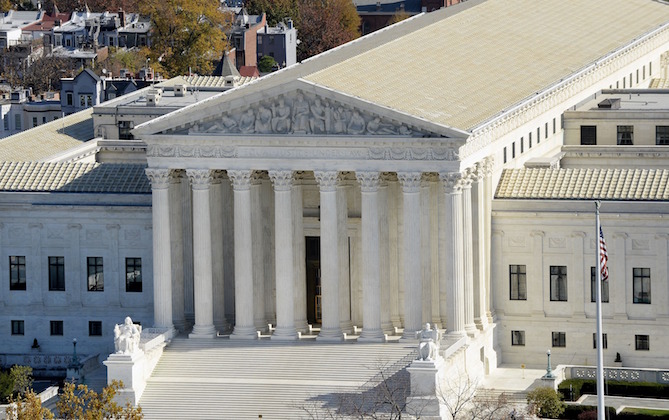SCOTUS Approves Trump's 'Muslim Ban'

Earlier this month, the Trump Administration asked the Supreme Court to weigh in on—and reinstate—its “Muslim ban,” which seeks to suspend the nation’s refugee program for 120 days and ban U.S. travel for nationals of six mostly Muslim countries (Iran, Libya, Somalia, Sudan, Syria and Yemen) for 90 days. Today (June 26), the Administration got its wish.
SCOTUS issued an unsigned opinion that partially lifts the injunctions affirmed by the United States Court of Appeals for the Fourth Circuit and United States Court of Appeals for the Ninth Circuit, which ruled that President Donald Trump’s executive order is unconstitutional and discriminatory. The high court also agreed to hear the federal government’s argument that the president has the power to set sweeping immigration policy. The court will hear the case in October, though it says in the decision that the case might action be moot by then, due to the time limits set in the executive order (referred to below as EO-2).
The opinion allows the travel ban to move forward, except that it “may not be enforced against foreign nationals who have a credible claim of a bona fide relationship with a person or entity in the United States.”
From the opinion:
The interest in preserving national security is “an urgent objective of the highest order.” Holder v. Humanitarian Law Project, 561 U. S. 1, 28 (2010). To prevent the government from pursuing that objective by enforcing §2(c) against foreign nationals unconnected to the United States would appreciably injure its interests, without alleviating obvious hardship to anyone else.
We accordingly grant the government’s stay applications in part and narrow the scope of the injunctions as to §2(c). The injunctions remain in place only with respect to parties similarly situated to Doe, Dr. Elshikh, and Hawaii. In practical terms, this means that §2(c) may not be enforced against foreign nationals who have a credible claim of a bona fide relationship with a person or entity in the United States. All other foreign nationals are subject to the provisions of EO–2. …
The Hawaii injunction extends beyond §2(c) to bar enforcement of the §6(a) suspension of refugee admissions and the §6(b) refugee cap. In our view, the equitable balance struck above applies in this context as well. An American individual or entity that has a bona fide relationship with a particular person seeking to enter the country as a refugee can legitimately claim concrete hardship if that person is excluded. As to these individuals and entities, we do not disturb the injunction. But when it comes to refugees who lack any such connection to the United States, for the reasons we have set out, the balance tips in favor of the Government’s compelling need to pro- vide for the Nation’s security. See supra, at 9–11; Haig v. Agee, 453 U. S. 280, 307 (1981).
The government’s application to stay the injunction with respect to §§6(a) and (b) is accordingly granted in part. Section 6(a) may not be enforced against an individual seeking admission as a refugee who can credibly claim a bona fide relationship with a person or entity in the United States. Nor may §6(b); that is, such a person may not be excluded pursuant to §6(b), even if the 50,000- person cap has been reached or exceeded. As applied to all other individuals, the provisions may take effect.
The Washington Post reports that Trump previously said the ban would be implemented 72 hours after SCOTUS approval.
President Trump issued an official statement on the decision via Sean Spicer:
Statement from @POTUS on Today's Unanimous Supreme Court Decision. pic.twitter.com/0TuHoRJzuT
— Sean Spicer (@PressSec) June 26, 2017
Meanwhile, the American Civil Liberties Union says it will not abandon the fight.
BREAKING: #SCOTUS to take up Trump's Muslim ban.
— ACLU National (@ACLU) June 26, 2017
We'll see him in court. #NoMuslimBanEVER
